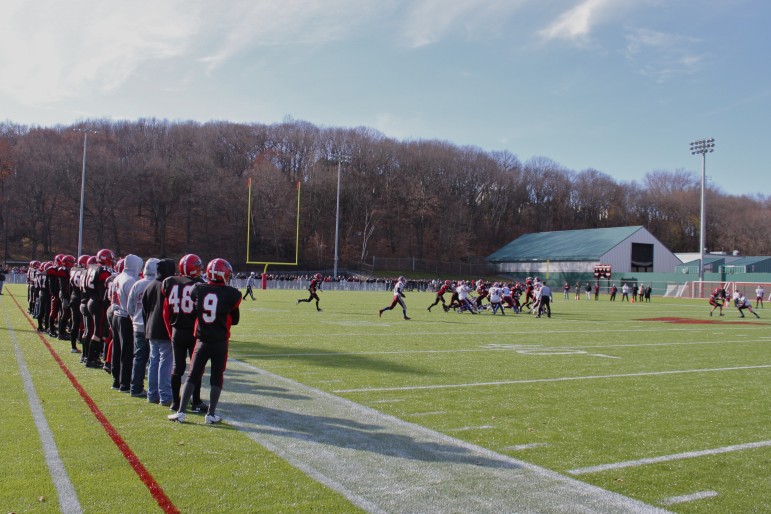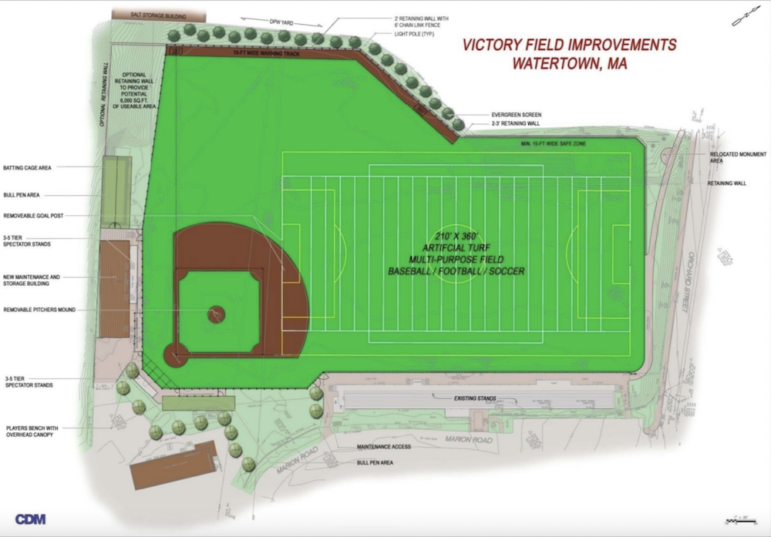
Charlie Breitrose The City Council voted to replace the artificial turf at Victory Field with a new artificial surface.
A new artificial turf surface will replace the current one at Victory Field’s stadium and baseball area.
Victory Field’s turf is used by seven Watertown High School teams — football, field hockey, boys and girls soccer, baseball and boys and girls lacrosse — along with Recreation Department programs, youth sports teams, and informal use by residents.
City Councilors approved the decision to put a turf surface with organic material between the plastic blades of grass in a split vote on Tuesday night. Before their decision the Council heard an hour and 20 minutes of comments from the public, with opinions on both sides but more supporting replacing the surface with new artificial turf.
City Manager George Proakis said he spoke with many people on both sides of the issue. He said he had to weigh the pros and cons when making his recommendation.
“When I look, on balance, at this particular issue, under this particular circumstance, I feel very confident being in front of the Council asking the Council for the money to do this field over with organic infill and the synthetic turf because I think it is the right recommended decision for our children and our community,” Proakis said. “That is what I have before you tonight.”
The current turf was installed in 2011, and has rubber pellets between the blades of artificial grass. The current field is nearing the end of its useful life, Proakis said. The Council approved a $1.5 million loan order to pay for the project. If a new surface is not installed over the summer, the City would need to add $20,000 worth of rubber pellets to make it soft enough to be approved for athletic use.
The new surface will have a material made from pine trees between the blades of grass called BrockFill, said Public Works Superintendent Greg St. Louis, and there would also be a foam pad layer beneath for added cushion.
The contract also calls for the recycling of the current synthetic turf, St. Louis said.
“In the contract language we specifically require that the existing material be recycled,” St. Louis said. “We require an affidavit from the contractor making them libel from cradle to grave of where the material goes. We are paying a premium for that service.”
The company that will be used, Shaw Sports, has a recycling facility, he said, and it is turned into the pads that go under the new surface.
Opponents of the new artificial surface have concerns about the health and environmental impact of the artificial surface. They called for a natural grass field to be used instead. WHS Athletic Director Ryan Murphy said that grass fields do not hold up to the amount of use that a synthetic field does, especially in rainy or snowy conditions. He estimates the schools use Victory Field 800-1,000 hours a year, often seven days a week.
If the Council were to vote against the field, it would not mean a grass field would be installed. Instead, Proakis said, during the first year more rubber fill would be added to keep it in use. It can’t be done in 2024 because that year the second phase of Victory Field improvement — the track oval and the courts — will be constructed that year.
If grass went into the stadium, Proakis said fewer sports could be played there, so Watertown’s premier girls sport, field hockey, would have to be moved to another spot. He believes that would not comply with the federal Title IX gender equity law, so equal facilities, such as bleachers and a press box, would have to be built at another field in town.

Council Vice President Vincent Piccirilli, who represents District C, said he had to wrestle with the pros and cons, and consider the risks and benefits when he made his decision. He added that people differ in what they consider what “acceptable risk is.”
“I am satisfied after doing much research that it reduces our risks to a minimal level,” Piccirilli said. “In 2011, I said I would not have voted for that project if I thought it posed a risk to our students or the public. I will vote for the project because I believe it is the best option and I do not think it represents a health risk to our children or the public.”
District A Councilor Nicole Gardner said she understands how important sports can be for students, and said her two children were competitive athletes in high school. However, she has concerns about the long term health impact of the plastic grass, and said that it also contributes to climate warming by creating a heat island.
“So for those two reasons — the potential harms of artificial turf in terms of climate and health … they will be here for generations to come,” Gardner said. “And I feel we should be planning now for our kids, their kids, their kids’ kids, and so on. Therefore, I cannot vote yes today.”
District D Councilor Emily Izzo said that she believes that voting against the replacement of the turf with artificial turf would be a disservice to Watertown’s student athletes.
“If we don’t approve the loan order to replace the turf with a more organic option, then it would be a vote to use more rubber infill, and I don’t feel right voting to approve spending $20,000 to make a bad situation worse,” Izzo said.
Councilor at Large John Airasian said that he does not think that the Council should be taking away access to an amenity from the public that they have now. He added that while he spoke to people in favor and against the new artificial turf, a majority supported the turf. He also noted that all the other communities in the Middlesex League, except one — Stoneham, have at least one artificial turf and Stoneham officials have plans to install three at the their new high school.
He added, “We need to look at the big picture and this is one of the amenities that a top-class suburban city should have, because that is what I believe Watertown is — a top class suburban city.”
Councilor at Large Caroline Bays also had concerns about the health risks of the turf, including that when she consulted several doctors they said that they have seen more serious injuries resulting from playing on artificial turf than on grass.
She added that the cost of maintaining the City’s grass fields is small compared to the cost of the installation of the artificial turf. The cost of the artificial turf will be $150,00o plus interest over the 10 years of the bond, while the City spent $75,000 on the care for all the grass fields in Watertown in Fiscal Year 2022.
“Imagine what we could do with grass turf if we put $150,000 into it,” Bays said. “We would have the best grass in the country.”
Councilor at Large John Gannon said that he had to weigh multiple issues when making the decision, including the environmental impact as well as the possibilities for open space. Watertown is just over four square miles in size and is built up, so the options are limited. He noted that Watertown had opportunities to purchase Oakley Country Club in the 1960s, and to build a new high school on what is now Arsenal Park, but Town Meeting voted against doing so.
“I researched what other city and towns in Massachusetts are doing if any converted away from artificial turf to grass,” Gannon said. “I could find very few and the ones that did, that town or city had another existing artificial turf.”
District B Councilor Lisa Feltner said she has been a strong supporter of environmental causes in Watertown, including being the Councilor who initiated the conversation to make creating a climate and energy action plan a top priority for the City Manager. She said, however, that she weighed the existing conditions and could not support going to a grass surface at Victory Field.
She looked into communities putting a moratorium on artificial turf fields, and only one had all grass fields. Most, she found, did so because of concerns about impacting drinking water aquifers (Watertown receives water from the MWRA), and all either had one artificial turf field or made an exception for their high school. She sees the issue as a lack of open green space in the City, which would need to be increased if Watertown was going to have enough to rest grass fields and rotate use.
“When you look at all the facts I don’t see a choice other than replacing the Victory Stadium turf with new and improved artificial turf,” she said. “And then I hope we can turn our attention to the fact that Watertown has too little acreage and too few locations of public open green space.”
Councilor at Large Tony Palomba said that he believes every councilor supports school sports, and knows how valuable they can be for young athletes to develop socially and emotionally. He said that he has heard innuendos about what a vote for or against the artificial turf means, which he disagreed with.
“I do think the idea that I consider a false dichotomy is that caring about kids equals artificial turf and not caring about kids equals opposing turf,” Palomba said. “You can care about kids and oppose artificial turf and you can care more about more about kids and oppose artificial turf.”
Palomba worries about people being exposed to the chemicals in plastic grass as it deteriorates.
“These chemicals are linked to a range of health problems — high cholesterol, thyroid disease, cancer and neurodevelopment,” he said. “It can accumulate in the body, can leak into the water and air. People can be exposed through inhalation, through absorption and ingestions.”
Council President Mark Sideris concluded the Council’s discussion saying that the decision was one of those difficult ones where one group will go home happy and one will go home saddened by the vote.
He noted that Cambridge has nine artificial turf fields, and decided to add another because they get so much use from them. Also, they are replacing the rubber infill with the same material that Watertown is looking at. Also, Belmont is installing two artificial turf fields at its new joint high school and middle school.
“For me, unfortunately, I support it wholeheartedly because we don’t have another choice, and I think it is the right thing to do for the City of Watertown and the right time to do it,” Sideris said.
The Council voted 6-3, with Gardner, Bays, and Palomba voting “no.”
Sounds like a thoughtful discussion of the issues on both sides. That’s how it’s supposed to work!
It’s understandable that people would try and make it seem reasonable to say that all these other towns are doing it, but that argument always reminds me of what I remember to be the reason for the extinction of the Dodo bird. There are likely many reasons for the extinction of the Dodo but one story I recall was that they they kept trying to do what the other birds were doing, fly. It seemed reasonable because others were doing it but it never worked out.
We are all our brothers keepers, Especially with our children. This is what should be the deciding factor. Take care of the physical health means taking care of the environment. The planet. . Without a healthy environment, you will have no health at all.